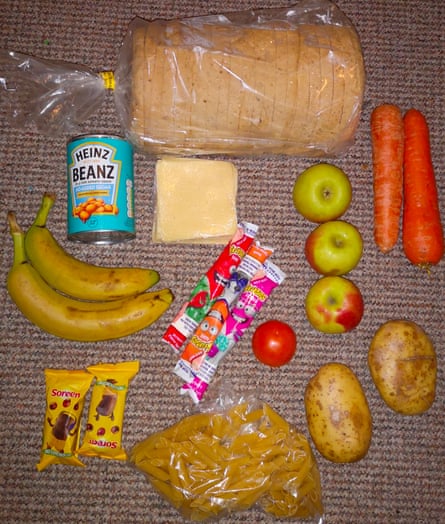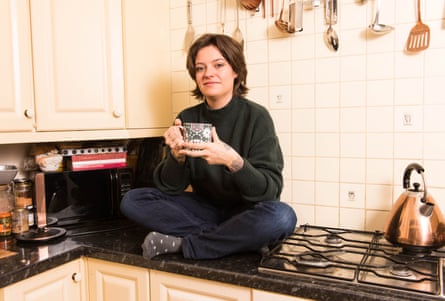I speak to Jack Monroe, cook, author and campaigner, towards the end of a tumultuous week in food poverty. On Monday, a Twitter user, @roadsidemum, posted a photo of a “hamper” she said was intended to replace her child’s free school lunches for two weeks. The provider, Chartwells, claimed it covered one week and was funded at £10.50. The contents wouldn’t have cost you £6 in any supermarket. Parents all over the country shared similar photos, food nothing short of contemptuous: half a red pepper, a quarter of an onion. What kind of company would employ someone to make sure no family gets too much onion? Monroe has been sent similar photos since March – the packages sent to shielding people, outsourced by the government to other companies, were similarly unimpressive, though “they got a couple of tins of pork as well. Every time I tried to make a noise about it, it was just like shouting in the wind.”
This time, the mood had changed; there was just so much about it that was repulsive – the idea that Chartwells, part of the giant catering corporation Compass, would skim profit off food meant for a child; the cronyism of how it got the contract in the first place (former Chartwells chairman Paul Walsh is a prominent Tory supporter who donated £10,000 to the party in 2010); the lobbying that led to the policy of hampers rather than vouchers, against the advice of child-poverty groups; the fact that such an incompetent government has the gall not to trust parents with money to feed their own children.
And the context has changed. “At the start of the pandemic,” Monroe says, “a lot of us were so scrambled by everything that was going on that the overwhelming response tended to be: ‘We’re just grateful to have some help.’ Now, it’s been quite a long time. Everybody who’s even smiled at anyone in the Tory party has got a contract in the grand chumocracy. And people are like: ‘What is this shit? How have you had time to sort that out, and we’re still getting brown bananas and half a tin of tuna?’”

By Tuesday, a No 10 spokesperson had called the contents of the hamper “unacceptable”, and claimed to be urgently looking into it; on Wednesday, Boris Johnson was taken apart at PMQs and his best response was to ask Keir Starmer why Marcus Rashford was so much more effective as a campaigner than the Labour party. (Quite a moment in politics, even in its current dishevelment, for the prime minister’s attack line to be: “Why aren’t you better at pointing out how bad I am?”) It looked like victory, for the most part: vouchers were to be reintroduced so parents could buy their own food. And then, on Thursday, briefed to the Times so that no one on a low income could read it, the news that there would be no free school meals over February’s half-term, with families forced to rely on council provision instead.
So Monroe hasn’t slept for three nights, but it doesn’t show in her eyes or her arguments. She’s talking from her kitchen in Southend-on-Sea, Essex; she got a studio light for her appearances on the BBC’s brilliant Daily Kitchen Live at the start of the first lockdown, and everything has a charismatic shimmer that makes you want to stand up and cheer when she lands a point. “They surely can’t think that there’s not going to be a noise about [February half-term], because of the maelstrom there has been over feeding children adequately over the last 48 to 72 hours. So my conspiracy brain goes: ‘What are they trying to cover with that outcry?’ But the other part of me says: ‘I don’t think they’re smart enough for that.’” She may not be tired, but she’s at the limit of her patience: this campaign started pre-pandemic. “We all fought so hard for that half-term meal provision this time last year. And then we had to get up and fight again for it in April, and again in the summer. Do we have to do this every time? Can we not just feed the children? Why do we keep on having to come back and beg for it?”
Monroe supplies the answer herself: that the people making these decisions are stratospherically distant from the people having to live them. “They don’t walk among us, they don’t know our stories, and they don’t ask for them. As soon as we start to speak up, they go ‘urgh, angry mob’.” She illustrates this with a story that is quite painful to hear, so God knows what it is like to have lived it. In 2011, she was a single mother to a one-year-old son, on benefits, teaching herself to cook and writing a blog that soon developed to include recipes for people relying on food banks or very small budgets. She did one interview with the Daily Star because they offered her £200 (“They were looking for someone who was about to have a really shit Christmas, and my friend said: ‘That sounds like you’”); from there she got a column in the Echo, an Essex local paper; later she worked for Huffington Post and had a regular recipe column in the Guardian. By 2013 she was doing ambassadorial work with Oxfam about the devastating effects of austerity.
“I’ll still never forget one parliamentary committee meeting. I’d been asked to talk about my experiences as a single mum in poverty. I was sitting directly behind Iain Duncan Smith. And I stood up, and I was shaking, and I’d put a nice blouse on to make them take me seriously. While I was speaking, I cried, I was so ashamed and embarrassed to be in this fancy building talking about using socks as sanitary towels. When I went back to my seat, I was shaking and still crying. Iain Duncan Smith said something to the person next to him, and they both laughed so hard. His shoulders were shaking with laughter. I had to leave, I felt humiliated. None of this is even new. The architects of these cruel policies have proven time and again to be immune to the everyday suffering of people they consider to be at the bottom of the pile.”
It is not at all easy to be the voice of anti-austerity through lived experience: for some people, you are never poor enough, or you were never poor for long enough. Monroe is heavily surveilled by the tabloid press, and constantly battered on social media. She won a court case against Katie Hopkins, who had libelled her on Twitter, having got her mixed up with the journalist Laurie Penny, but such intoxicating moments are diluted by a large number of keyboard warriors just being jerks. She finds it particularly hard since she has ADHD, “part of which is something called rejection sensitive dysphoria, which means that you take criticism very, very badly”.
As a child, she was also diagnosed as being on the autistic spectrum, which she says makes her very straight-talking. “A friend said: ‘The problem is, you’re so honest that people assume you’re being dishonest, almost.” This leaves her very exposed, and she worries constantly about making a mistake, even a trivial one. “I now live my life through a filter that whatever comes out of my mouth, a thousand people on the internet are going to put the worst possible spin on it and throw it back at me.”
She carries on because she is passionate about hunger during childhood and its awful impacts – it limits kids’ ability to learn, interferes with their brain development, their ability to retain information, has a permanent effect on neural pathways and hormonal response. She saw all this first-hand as a child, when her parents – her mother was a nurse, her father a firefighter; “We lived in a house, it had a roof, I went to grammar school” – took in foster children. “We looked after a child who, in the middle of the night, would sneak down to the kitchen and basically eat food from the freezer. Everyone was well fed but they were so food insecure that they would be up in the middle of the night stuffing frozen chips in their mouths. I met children who were so feral and afraid, and I saw with my own eyes that with three meals on the table and a lot of love, their shoulders went down a bit, their jaws unclenched, they stopped looking round at where the next threat was coming from. Children who have grown into beautiful adults because they were loved and fed.” Her evolution as a campaigner she describes as the inevitable legacy of a happy upbringing. “It’s just the way I was raised – if there’s space at the table, shove up and make room. If you’ve got spare in your fridge, share it.”
Yet, having known the fear of scarcity herself, Monroe still carries a huge weight of anxiety. She resigned from the fire brigade under a huge amount of stress, finding it impossible to balance childcare with her 15-hour shifts as a call handler, then tried to rescind her resignation the next morning, only to find her manager wouldn’t take her back. This set off a cascade into deep poverty, as casual jobs were scarce and both benefits and services pared back. On benefits, she was barely able to eat, and when in 2013 she got her first major paid writing gig – a book contract with Penguin for A Girl Called Jack: 100 Delicious Budget Recipes – it was enough to banjax her housing benefit but not enough to pay the rent, and she got evicted.

She still can’t open an envelope if it looks like a bill, and takes me on a Zoom tour of a room where she keeps her post: six years’ worth of unopened brown envelopes, pristine and neatly stacked. She can’t open the front door to strangers, since “a long period in my life where the only people who knocked on the door were bailiffs or debt collectors”; still has a panic response when she puts her pin in a card machine in case it gets rejected. “I’m on the highest possible dose of antidepressants, anti-anxiety medication. I used to drink myself into a stupor so these thoughts would go away. I’m still in therapy. I’ve had several breakdowns … For people who think I wasn’t poor enough to warrant this suffering, I think: ‘How dare you. How dare you take the few facts you know about my life and try to count my suffering brownie points and tell me when I should get over it?’”
It would go completely against her nature to walk away from the issue of food poverty, but weeks like this one take a toll. “I’m trying to keep really busy, so when those feelings start to creep in, I’m like, ‘Not now, demons, I’ve got to go on LBC and then write something for Vogue.’”
In 2015, Monroe came out as non-binary, having previously identified as a cisgender lesbian; she’s happy with either “she” or “they” as a pronoun, but is keen for me to stress that I asked, because she has passionate supporters on social media – 375,000 of them, at the last count – who would be vexed if they thought she had been misgendered. “I want to tell them: ‘Jack doesn’t give a shit,’” she says, laughing. “We’re talking about child hunger, here.”
Her plan now is to jettison every interview, every engagement, that doesn’t move things closer to eradicating poverty, and she’s writing two books at once, one – her seventh – about cooking on a budget, “like a modern day Mrs Beeton, without the parakeet pie”, the other about the impact on women of austerity. Jack Monroe is only 32; she has lived her adult life at the sharpest end of Conservative policies. She is the living embodiment of the suffering that fiscal tightening causes, and also the most admirable person you will ever meet. She reminds me of Jack-a-Roe, the folksong heroine – swashbuckling, brave, sensitive, intelligent, kind. Life’s tough but she’s tougher. No government can kill the spirit, but it’s chastening to think how hard they try.
The books she’s working on, she says, represent her strategy, which is split in two. “It’s helping people who are absolutely on their knees right now, trying to signpost them, answer their questions, give some practical help, just for things to be a little less awful. And then there’s: ‘Hey you, people who are causing this. Sort your shit out.” On the second, she feels that this week has galvanised the anti-poverty movement. “I think if the government really do try to implement austerity 2.0, the roar against it will be deafening. People are tired, and they’re hungry, and they’ve had enough.”
Self-deprecating to a completely unwarranted degree, Monroe follows every crescendo with the reminder, in some elegant variation, that she’s not speaking for – still less over – the millions of people who are struggling. “I’m letting their voices funnel through my great flapping mouth … I have a platform, so I’m asked again and again to advocate for people who are still in poverty, but I’m just trying to gather their stories.” She doesn’t see herself as the leader of any movement, for all that she might look like it. “It all sounds a lot more organised than it is. Basically I just wake up, look at the news, and get angry. I make it sound like I’ve got a whiteboard somewhere. There is no whiteboard. Not all of us will do everything that’s needed, all the time. It doesn’t matter so long as everyone does something.”
We end the conversation with me chasing her off the line, because I know she has more interviews to do, and seven minutes for a day’s worth of basic self-care, such as having a glass of water. She doesn’t really look after herself, which makes you feel quite protective; but it’s her worldview, as much as her person, you want to protect.
This article was amended on 17 January 2021. The caption on the main photo was changed to remove a quote that was inappropriate in that context.
